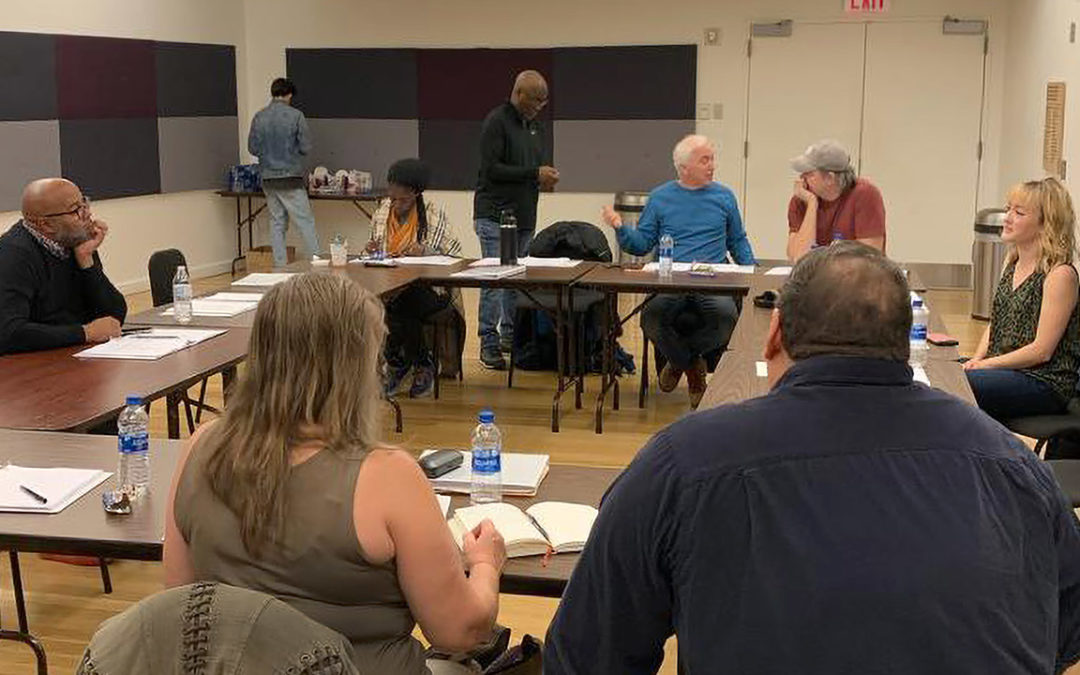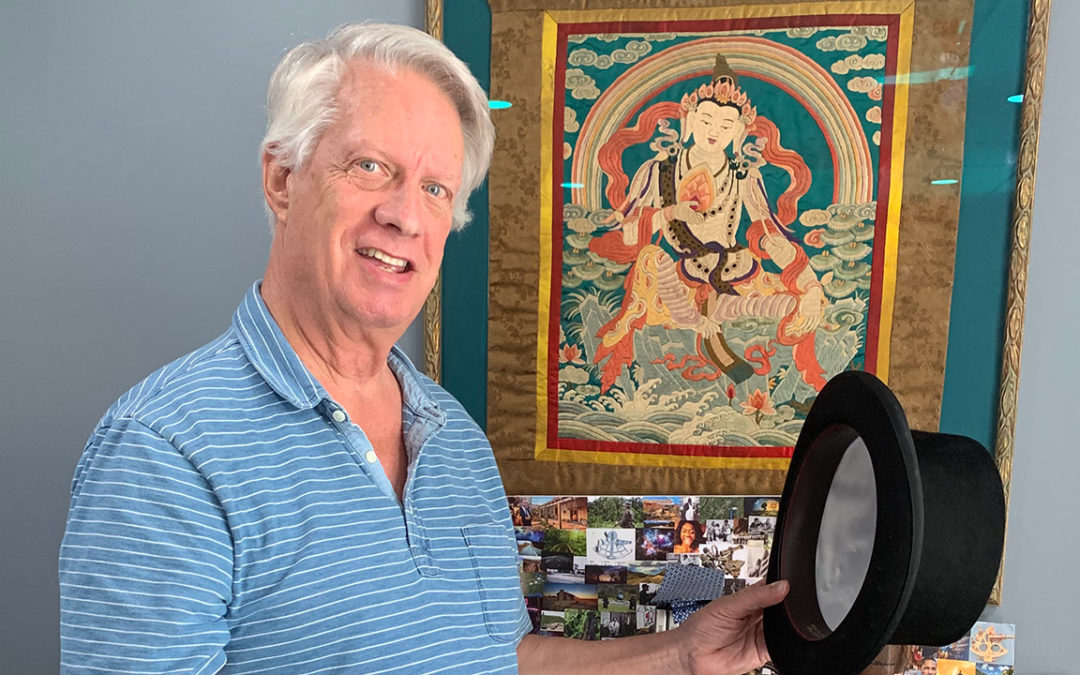
by Robert Bowie, Jr. | Feb 18, 2020 | Featured, Law, News, ONAJE, ONAJE Update, Operetta, Plays, Poetry
Okay, I may have a problem. I am a recovering lawyer and now aspiring playwright and poet. Is it possible that I miss time sheets? “Every six minutes” for a lifetime?
People used to say: “You are what you eat,” but what if you are what you “do” or have done?
Maybe I’m getting worse. At the law firm, I made a rule that if anybody could finish a story that I was telling I would stop telling it.
Now I don’t care. If I can get a second laugh or even a third from the same story I will repeat it, again and again. (And I’m going deaf so I’m the only one who doesn’t have to hear it.) It could be senility. It could be I’ve lost any sense of embarrassment, but it definitely demonstrates no merciful memory loss, at all.
The other thing is, even in retirement I must “work.” I have grown even more intolerant of delay because everything I’ve written should be on stage by now! Damn it!
What has happened to me?
In the past year, I have written or rewritten three plays. One (Onaje) has been produced in New York, two will be produced in New York (Vox Populi, for which I wrote the libretto, and The Grace of God & The Man Machine). Another, The Naked House Painting Society, is looking for a home.
Yes, I used to be impatient as a lawyer but now my stuff is not produced fast enough? Do I still need litigation? The need to measure work on massive conflicts in tight building blocks of measured time along with a new project have made me afraid.
I have started working on a poem based on Dante’s Inferno. Dante’s Inferno has 34 cantos and 23 six-line stanzas in each canto. That in itself was my wake-up call. How sick is this?
The law can definitely create “delusions of grandeur.” Might it also imprint the structured, ordered, anal impact of time sheets?
Is it now that I require 34 cantos and 23 six-line stanzas in each canto? Seriously? But I haven’t given into it yet, I think.
Still, as I started the Prologue and began to “write about what I know,“ I found a schizophrenic litigator’s theme begging for harmony. This is how it starts:
Prologue
With first light, or birth, or perhaps before/
And maybe after, comes the dialogue:/
The debate in the mind. Waves on the shore/
Each overriding the last. No monologue./
Two nagging voices in constant conflict./
One “as doubt“ the other “as hope,“ both spent/
Bickering on some path I did not pick/
Living the daily schedule of events/
As I wake and wonder where each day went:/
The debate in the mind. Waves on the shore/
Each overriding the last. What event,/
What plea, what prayer from my central core,/
What keeper of my life long travel log/
Can cure me of this endless dialogue?/
I start with a sonnet? How sick is this?
T.S. Eliot said:
“evenings, mornings, afternoons,/
I have measured out my like with coffee spoons;”/
And the poor man was just a banker.
Still, it will be funny and too long for me to repeat, so that may be progress.

by Robert Bowie, Jr. | Nov 19, 2019 | Featured, ONAJE, ONAJE Update, Politics
Sometimes, it seems as if Amtrak travels through America’s subconscious.
Last Sunday, on a cloudy afternoon, I took the train up to NYC for the “table read” of my new draft of Onaje. I put The New York Times on the seat next to me and looked out at the graffiti on the abutments of the bridges and junked cars in back yards.
We are divided by our politicians, but are we now divided from our children too? I had read about why the “millennials” blame the “baby boomers” for the world they have inherited and had wondered if there was a common beginning to all of this.
The millennials don’t have the ”spoiled child” anger of “sex, drugs and rock & roll” and “never trust anyone over the age of 30,” which was the mantra of my generation. Their anger is the residue of all that.
We were born into the rich, expanding post-war economy. They want a job to pay off the student loans for the education to get the job they never got.
How could this have happened?
To placate us, President Lyndon Johnson, ended the draft. Our parents — all of them — had been drafted and went to war together to defeat fascist nation states and rebuild a capitalist Europe, to allow free trade to rebuild the devastated nations that we had defeated, and then to break down walls to offer freedom for others.
For the college-educated boomers, it had been acceptable to avoid the draft, because we didn’t approve of the war.
Unintentionally, by doing so, we split the nation the millennials inherited into the privileged rich who would not, and the working poor who would fight our future foreign wars and salute our flag, after the privileged draft-dodgers had felt free to burn it.
The thing is, the “privileged” never followed through. After we graduated, the Peace Corps and public service became old news. We had bumper stickers that said: “The One Who Dies With The Most Toys Wins.”
We were too self-obsessed to notice that the seeds which had created WWII were composting here in our country as we let the economics of disenfranchisement grow.
NAFTA would bring those seeds to bloom with immigration reform. It was predestined, as the privileged got richer and the jobs of the working poor left town, and women still remained unprotected ( “Me Too”), and the city slums expanded ( “Black Lives Matter“). The white working poor were easily fanned into racist hate as they were left behind.
It was painfully ironic on Monday, at the reading, when the actors brought the past into the present. They brought to life a play about savage racist riots which happen in 1967, just as the early boomers went off to college.
It was painful to see how the cast of white and black Americans could so brilliantly bring the hate and violence between the races to life, and then break from their characters and become friends so easily and talk and laugh. It stood in stark contrast to the story of the play and to the anger presently in our country, now so divided that even families are unable to communicate.
How could this be? It may be that the actors had a common goal that was bigger than any individual in that room. They needed each other and enjoyed each other as they brought that common goal to fruition.
Perhaps the boomers thought only of themselves. The one percent now has all the toys. In the end, we are what we do, not what we say. We said we were ”peace and love,” but we had no commitment to anything other than to our avarice and greed.
We earned Trump and his bone spurs. He is one of us.
I have provided the names of these wonderful actors. Watch for them on TV and on the New York stages. They are each and everyone of them brilliant: Joe Dellger, C.E. Smith, Tim Rush, Khiry Walker, Adam Couperthwaite, Laura Darrell, Mary E. Hodges, Johnny Shea, and Erin O’Brien.

by Robert Bowie, Jr. | Oct 22, 2019 | Featured, Poetry
Working on the libretto for the operetta, Vox Populi, has brought me back to my love of poetry.
My favorite poems create a universe with a few words. Two good poems with a similar subject, put side by side, can introduce the creator of the other.
Like a painter organizes color and shape with his or her brushstrokes, the poet organizes a vision with the sound and rhythm of words:
“Whose woods these are I think I know./
His house is in the village though;/“
The brushstrokes? The sound and rhythm of these two lines? Speak them out loud. They are like the rocking of a hammock they are so smooth and quiet.
In complete contrast however:
“I sought a theme and sought for it in vain,/
I sought it daily for six weeks or so./“
Brush strokes? This is not like the rocking of a hammock, it is like riding a three-legged horse.
Those are the opening two lines of two completely different poems by two completely different people. Now let’s look at the last two lines of these two poems.
“And miles to go before I sleep./
And miles to go before I sleep./“
Brush strokes? The same rocking hammock. Compared to:
“I must lie down where all the ladders start,/
In the foul rag-and- bone shop of the heart./“
That must’ve been a hell of a rough ride? You are correct.
They are both about the end of life. The first by Robert Frost is entitled “Stopping by Woods on a Snowy Evening” and the second by WB Yeats is in titled “The Circus Animals’ Desertion.”
Both are about “acceptance,” it seems to me, but that acceptance comes in completely different, very personal forms. Frost’s, in a late evening snowy New Hampshire woods, and Yates’, with the casting off his “Circus Animals” (his life’s work of Irish themes).
The libretto for the operetta is meant to be baudy and entertaining. My poetry, on the other hand, is a personal statement that is directed from me to the reader. It’s from my heart.
I have placed links to both poems below for your review and your own contrasts and conclusions. Feel compassion for these two people. They are writing because they are reaching out to you.
“Stopping by Woods on a Snowy Evening” by Robert Frost
“The Circus Animals’ Desertion” by W.B. Yeats

by Robert Bowie, Jr. | Sep 24, 2019 | Featured, ONAJE, ONAJE Update, Operetta, Plays, Travel
So his fool tells King Lear: ”Thou shouldst not have been old till thou hadst been wise.”
I am 72 years old today and one step further into my next life. No not the afterlife… the next step and the opportunity of freedom which that entails. As it’s my birthday, I hope you’ll allow me this time to reflect…
I decided to start this blog several years ago to chronicle what would happen to me in retirement. I loved the practice of law, but concluded that there is a time to retire before you get in people’s way and can’t find the bathroom. I wanted to stay a little bit ahead of that curve so I got out early.
I already knew that eccentricity and determination always trumps a loss of intelligence. So this was my chance to be free to try something entirely different, but I still was not free of trepidation. Delusions of grandeur are a wonderful thing until you start to think you might act on them.
Nonetheless, I first decided I would become a “political force” as a Democrat in an entirely gerrymandered Republican district because I was very concerned about how we, as a country, were being divided by political forces and I was going to change that. This was Trump country. I raised more money than all my Republican opponents combined and knocked on almost 7000 doors for more than a half a year. I was resoundingly defeated and Trump became our president.
Because I obviously had learned nothing about impossibility, next I decided I would become a professional playwright. I bought a Shakespeare coffee mug and applied to the Yale Drama school, fully believing that I would be the oldest applicant ever accepted to Yale’s drama school. I succeeded only in becoming the oldest applicant ever rejected by Yale’s drama school. Nonetheless, I had decided this is what I wanted to do.
Obviously I had to rethink this thing again, with just a little more of my failing intelligence. So I applied to the Commercial Theater Institute (CTI) of New York for a class in producing theater. I had a plan. When the first morning of class broke up the students got lunch and inevitability they talked about what plays they were considering producing. When it came to my turn to talk I informed them I wasn’t considering producing anything. I wanted them to produce me. It worked. The impossible happened. A young producer agreed to read my work, liked it and arranged for professional staged readings in San Francisco and later in New York.
Because I had excelled in something I didn’t want to do and I had completed an introductory class in it, I applied for an advanced class in producing at the prestigious O’Neill Conference in Waterford Connecticut. I got in and there I met Sue Conover Marinello, who produced my play Onaje with great success last year in New York, and Christian De Gré Cardenas of Mind the Art Entertainment who has an amazing history of producing and also writing the music for a number of amazing operettas in New York. Both became friends.
After Sue Conover Marinello’s production of Onaje in New York, Mind the Art commissioned me to write the libretto for an operetta, Vox Populi, a comedy about the seventh deadly sin of pride, for Christian’s music. Last month, Christian and I completed the operetta in San Miguel Mexico.
Because Onaje had done so well, Sue convinced Kevin R. Free, the wonderful NYC director, to read the script. Kevin had fresh and original insights which lead to my reworking the script and his commitment to direct its next production.
The blog has become a happy travelogue. It is a history of mistakes and opportunities. It has taught me that even though I may not succeed in any of this, I’ve lost the fear of failure and each day is more fun than the last. The next step into a new thing is the hardest thing I ever do but it is getting easier with age.



